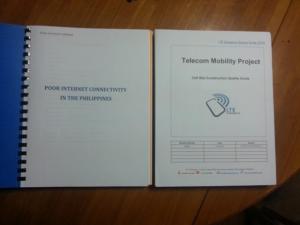A technical paper that embarks upon the actual objectives of the State for the benefit of stakeholders and users of Internet Services in the Philippines will shed light on the existing and future aspects of the service.
Such a paper shall make apparent all the reasons and basis for explaining the current state of Internet in the Philippines.
As the situation stands, Internet service in the country today is miserably slow and yet it counts as being among the most expensive all over the world. Why did such a situation come into being? How were investments and revenues of the licensed providers used to allow this to happen? What factors helped cause the snail paced speed of Internet in spite of exorbitant earnings amassed by providers from helpless subscribers? In the face of such wretched conditions is the Philippine Government simply going to stay immobile and inutile and not lift a hand to correct the problem?
A huge volume of literature abound on the problem of very slow Internet in the Philippines and the attendant malady of extremely high prices for Internet subscription. Most of the existing material about the causes of poor Internet Connectivity relate to technical concerns. Some of the current literature are ZTE [2014]; Huawei [2015]; Alcatel-Lucent [2015]; Ericsson [2015]; Nokia Solutions and Networks [2013]; Anritsu [2015]; Motorola [2008], among many others.
These technical literature taken against the backdrop of Philippine providers of mobility and Internet service give the best rationale and causalities that show how and why Internet connectivity in the country is deplorably sluggish and will never improve in the many years to come.
Some literature however, written poorly and pretend to provide non evidence-based arguments about why Internet is so slow in the Philippines portray the wrong side of the picture and mislead the intelligentsia as well as the public in general.
Such entities ranging from institutions such as Ookla [2015], Akamai [2015], to TelecomAsia [2015-16], the international agencies in and outside of Manila [2016], among too many others, should be guilty of purveying literary material that do not help the concerned audiences understand why Internet is too decrepit and execrable – and especially why only in the Philippines.
These institutions have been putting out as many waste material into the ecosystem that blur the public’s understanding and cloud the entire issue about why Internet is never improving in the Philippines when all the means and methodologies are there to cure the problem.
On one hand, the great number of publications that show how lethargic and almost on the verge of dying the speed of Internet in the country is, are the very same literature that provide the correct solutions to increasing the speed of the Internet based on the results of scientific research, perfected models and technologies, reliable evidence and experience.
On the other hand, voluminous literature pertaining to governing rules, regulations, standards and international covenants, agreements, resolutions that need to be followed to arrest the acute malady are not propagated in the public milieu. These literature, being steeped in legalese are treated with disfavor by selected quarters that benefit from the current situation and prohibit the same from being disseminated. Productivity Commission International Telecommunications Union [2002]; US Federal Government Council of Economic Advisers [2015]; Republic of the Philippines Congress [2014]; Commonwealth Broadcasting Association [2008]; United Nations Office on Drugs and Crime [2013]; European Commission [2012]; World Bank [2009]; International Telecommunications Union, World Radiocommunications Conference 2015 (WRC15) [2015]; Asia Pacific Telecommunity [2012]; to name but a few.
Even Philippine Media is just as culpable for swallowing the conventional wisdom about the causes of poor Internet connectivity in the country hook, line and sinker. As sure as the sun rises each morning, some members of the Media are clearly guilty for taking rewards and incentives to keep the public ignorant about what causes slow Internet in the country and why domestic and international laws, rules and regulations, covenants, standards and best practices are not being followed in the Philippines.
It must be stressed here, that such non-compliance of rules, covenants, agreements and resolutions, forms nearly ninety percent (90%) of the raison d’ etre as to why Internet is too slow in the Philippines. And yet, none of the current make-believe literature falsely claiming to be intelligent studies about the slow and costly Internet services in the country actually pay respect to the fact that the Philippines is not compliant with the existing rules, regulations, standards, covenants, resolutions on Radiocommunications as promulgated at the level of bodies such as the Asia Pacific Telecommunity (APT), International Telecommunications Union (ITU) and many other similar telecom governing bodies.
This is where the problem really lies and this technical paper proceeds to report on the exceedingly dire consequences of the Philippines defiance of laws, regulations, international covenants, resolutions, agreements pertaining to proper behavior in the telecom sector.
From out of this severe, highly insubordinate posture of the Philippines, arises a myriad of problems that are the very cause of:
- poor Internet connectivity
- dropped calls in the middle of conversations over mobile telephone
- frequent inability to call by mobile phone
- delayed SMS messages (texts)
- recurring problem of signal interruption in television broadcasts; and,
- many other mobility and Internet problems
Because of the public’s inherent and sacred right to information, this technical paper was written precisely to spread awareness of what goes on behind the perceived Philippine telecom industry that at present is distortedly depicted to the public.
The authors anticipate a better understanding of why Internet service in the Philippines is excruciatingly slow and yet only those that can afford, are able to pay the high cost of having decent Internet connections in their homes or places of business.
In the face of the inevitable coming of the phenomenon of "Internet of Things (IoT)" all those that are concerned should act now and not sit on the fence only to regret our undoings later.
For any questions, comments or suggestions pertaining to this article, please email us at: onecybergroup@gmail.com or asiacommunications@msn.com.
Or call or send SMS at 09954398612; 09999779997.
For any questions, comments or suggestions pertaining to this article, please email us at: onecybergroup@gmail.com or asiacommunications@msn.com.
Or call or send SMS at 09954398612; 09999779997.


No comments:
Post a Comment